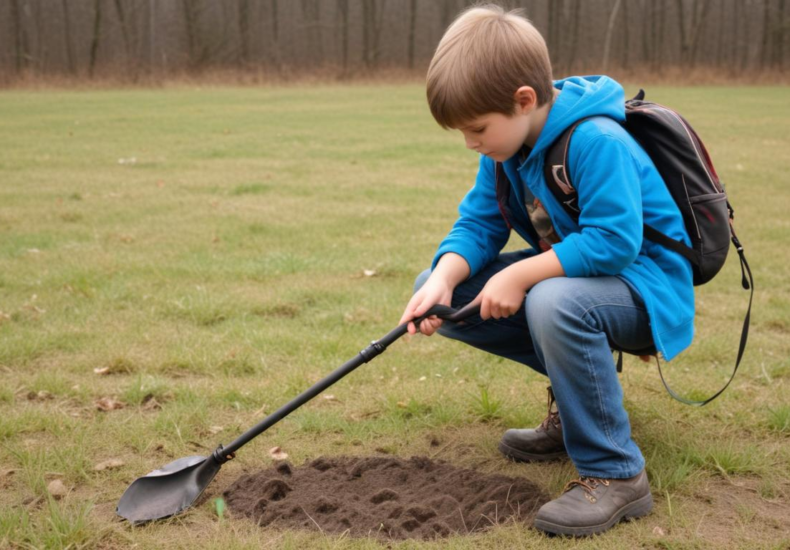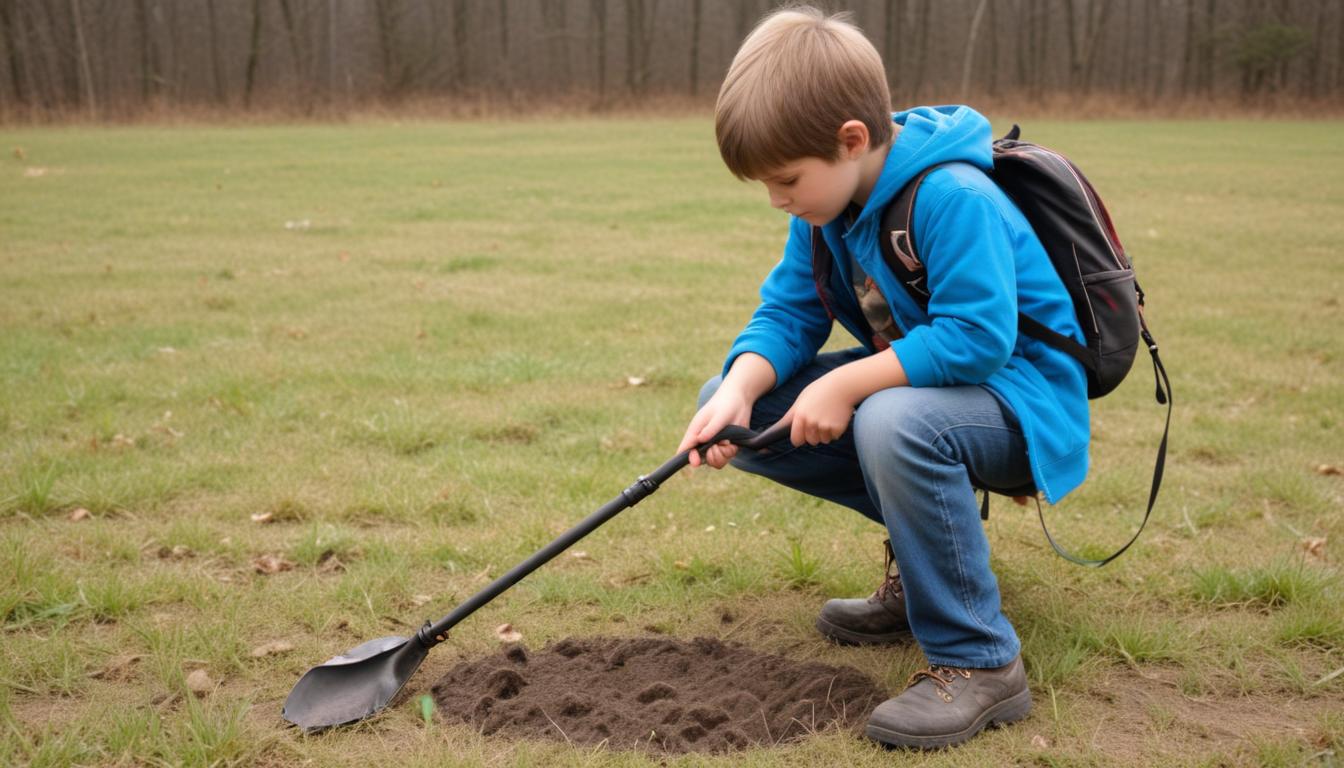
How to teach kids responsible metal detecting habits
Selecting the right equipment for children is essential when introducing them to metal detecting, a fun and educational family hobby. The key is to choose a metal detector that is lightweight and designed for easy handling by younger users. Many manufacturers offer models specifically tailored for children, featuring adjustable handles to accommodate growth and lighter frames to prevent fatigue.
When choosing a metal detector for kids, consider the simplicity of the device. It’s important to select a model that is straightforward to use, allowing kids to operate it with minimal adult assistance. This fosters a sense of independence and encourages them to learn and explore on their own. Look for detectors with simple controls and features like target identification and automatic ground balancing, which can help reduce frustration and increase the enjoyment of the hunt.
The durability of the metal detector is also crucial. Kids detecting can sometimes be rough on equipment, so it’s worth investing in a unit that can withstand some bumps and drops. Waterproof features are an added bonus, especially if your young explorer is likely to venture into damp areas or shallow water.
Lastly, integrating the ethics of metal detecting into the choice of equipment can help instill responsible habits from the start. Choose a detector that is versatile enough to encourage exploration in a variety of environments, simultaneously educating children about the importance of respecting historical sites and natural landscapes. This education, paired with the right tool, will lay the foundation for a respectful approach to this engaging activity.
Understanding and respecting the law
Understanding and respecting the law is a critical aspect of teaching kids about metal detecting, which is more than just a family hobby; it’s an opportunity to instill important values. Before heading out, it’s essential to ensure that kids are aware of the legal framework surrounding metal detecting. This includes educating them about the need for permissions to search in specific areas like parks, historical sites, or private properties.
Different areas have varied rules regarding the use of metal detectors. For instance, some parks may allow detecting only in designated areas, while historical sites might completely prohibit it to preserve archaeological integrity. Emphasizing the importance of researching and adhering to these guidelines helps kids understand the significance of legal boundaries and the consequences of ignoring them.
Moreover, discussing the ethical implications of detecting items and the legal responsibilities involved in reporting finds is crucial. In many places, there are clear laws regarding the discovery of artifacts, especially items that could be of historical significance. By teaching kids to report their finds to the appropriate authorities, they learn the ethics of metal detecting alongside its practice. This not only aids in the preservation of cultural heritage but also inculcates a sense of responsibility and integrity in young detectors.
Conversations about these legal and ethical aspects should be ongoing, reinforcing the notion that responsible metal detecting respects both the law and the historical narratives of the places searched. Adopting practices such as obtaining proper permissions, staying informed about the local laws, and respecting property boundaries contributes to making metal detecting a conscientious and educational experience for the entire family.
Importance of environmental stewardship
Embracing the importance of environmental stewardship is paramount when teaching kids how to engage in metal detecting responsibly. This not only involves instructing them on the proper ways to handle found objects but also guiding them on how to minimize their impact on the surrounding environment. As metal detecting is frequently done outdoors in various natural settings, educating young enthusiasts about preserving these areas ensures the sustainability of this family hobby for future generations.
One of the first steps toward fostering environmental stewardship is teaching kids the “leave no trace” principles. This means explaining the importance of filling any holes they dig and disposing of any trash they might encounter, even if it’s not their own. Such practices help maintain the natural beauty and ecological integrity of the environments where they are detecting. Imparting these practices early on cultivates a sense of responsibility and care towards nature.
Additionally, it’s beneficial to educate children about the local wildlife and plants in the areas where they will be detecting. This knowledge helps them recognize the importance of certain habitats and the role they play in the ecosystem. Kids should learn that their actions can directly impact the lives of plants and animals, teaching them to tread lightly and respect their surroundings.
It is also crucial to incorporate the ethics of metal detecting within the broader context of environmental conservation. Children should understand why certain areas are off-limits and the reasons behind seasonal restrictions or conservation efforts. Discussing these topics not only broadens their knowledge but also helps them see the bigger picture of their hobby’s impact on the world around them.
By introducing the concept of stewardship through metal detecting, children can develop a deep appreciation for nature and learn valuable lessons in conservation. This combination of enjoyment and education supports the idea that metal detecting can be more than just a pastime; it’s an opportunity to contribute positively to environmental preservation.
Practical tips for field safety

When it comes to metal detecting as a family hobby, ensuring the safety of young enthusiasts in the field is a paramount concern. Practical tips for field safety are crucial to help children enjoy their time detecting while minimizing any risks involved. Here are some practical safety tips for kids detecting and their families.
First and foremost, it’s important to dress appropriately for the activity. Equipping kids with sturdy footwear is essential to protect their feet from sharp objects or uneven terrain. Long pants and long-sleeved shirts can help shield their skin from scrapes and the sun, while gloves can keep their hands safe when digging or handling discovered items. Always remember to apply sunscreen and insect repellent as needed to protect against sunburn and bites from ticks or mosquitoes, which are common in areas where metal detecting is popular.
Teaching kids to be aware of their surroundings is also critical. Before they begin detecting, make sure they know how to recognize potentially dangerous areas, such as unstable ground, bodies of water, or regions with thick underbrush that could hide hazards. Remind children to stay within designated safe zones and within sight of a supervising adult at all times. Moreover, children should be taught to identify and avoid plants like poison ivy and to check for signs of wildlife that could present a danger.
Metal detectors themselves must be handled correctly to ensure they are safe to use. Kids should learn how to operate their equipment properly, including understanding its weight and how to carry it without strain. Regular checks for loose parts or damaged elements can prevent accidents related to equipment malfunction.
Additionally, hydration should not be overlooked. Encourage kids to take frequent water breaks, especially on hot or sunny days, to prevent dehydration. Providing children with their own water bottles makes it easier for them to manage their hydration levels independently during a hunt.
Lastly, discussing and enforcing the ethics of metal detecting with regards to safety is also essential. Children should be taught to respect private properties and understand the boundaries of where they can detect. This respect for rules and regulations not only enhances safety but supports the ethical standards of the hobby.
By following these practical tips, families can enjoy metal detecting outings that are not only fun and educational but also safe, ensuring that this family hobby provides positive memories and valuable learning experiences for everyone involved.
Encouraging patience and persistence
Encouraging patience and persistence in kids while they engage in metal detecting, a fulfilling family hobby, can offer profound long-term benefits. It’s important to emphasize the value of these qualities early on, as they are essential for enjoying and succeeding in this activity.
To instill patience, start by setting realistic expectations about finding treasures. Kids should understand that while metal detecting can be very rewarding, significant finds are rare and often come after many hours of searching. Teaching them to enjoy the process rather than just the outcomes helps cultivate patience. Sharing stories of historical discoveries and how long those detectors searched before finding something can also provide perspective and motivate persistence.
It’s also beneficial to involve kids in planning their metal detecting outings. This can include researching locations, learning about the historical significance of different sites, and understanding what might realistically be found there. By engaging in the preparation process, kids become invested in the experience and are more likely to be patient during the actual detecting.
Furthermore, incorporating games and challenges into metal detecting can make the waiting more enjoyable. For instance, you can create a scavenger hunt with a list of common metal objects they might find, such as coins, nails, or can tabs. This turns their focus towards achieving smaller goals within their hobby, promoting both patience and persistence.
Acknowledging and celebrating all finds, not just the valuable ones, is crucial in reinforcing the ethics of patience and persistence. Each item discovered, no matter how mundane it may seem, is a success and a chance to learn something new. This practice helps children appreciate the smaller victories and understand that every find has a story.
Lastly, share your own experiences with persistence when it comes to metal detecting or in other aspects of life. Kids detecting often look up to adults and learning about your challenges and how you overcame them can inspire them to keep trying, even when they don’t find something immediately.
By nurturing these traits through the family hobby of metal detecting, kids not only gain a deeper appreciation for the activity but also develop important life skills that extend beyond the field.
You may also like
Archives
Calendar
| M | T | W | T | F | S | S |
|---|---|---|---|---|---|---|
| 1 | 2 | 3 | 4 | |||
| 5 | 6 | 7 | 8 | 9 | 10 | 11 |
| 12 | 13 | 14 | 15 | 16 | 17 | 18 |
| 19 | 20 | 21 | 22 | 23 | 24 | 25 |
| 26 | 27 | 28 | 29 | 30 | 31 | |
Leave a Reply